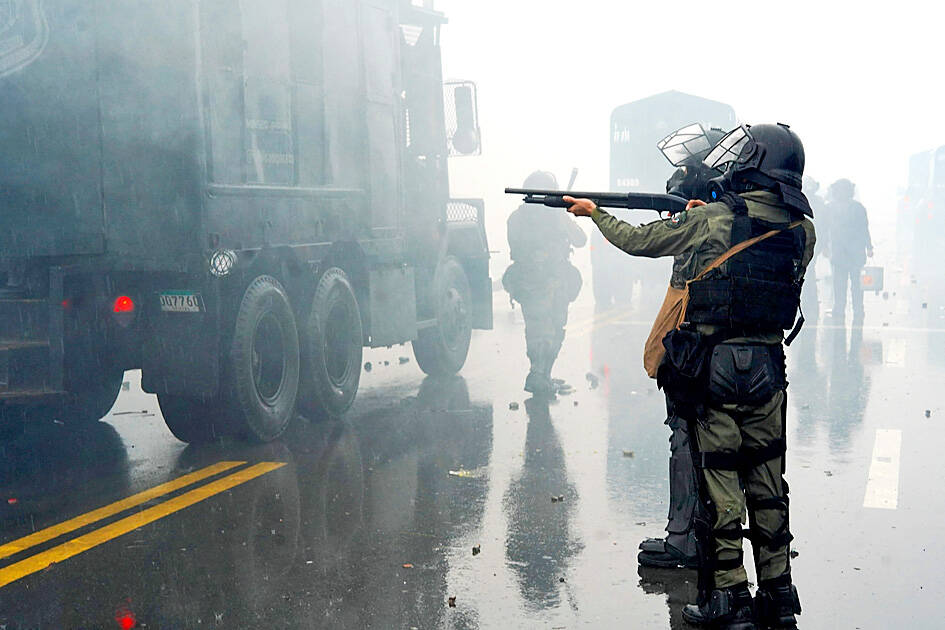Panamanian authorities on Saturday partially suspended Internet and mobile phone service in a western province where a state of emergency was in effect after two months of anti-government unrest.
Right-wing Panamanian President Jose Raul Mulino declared the emergency on Friday, suspending freedom of assembly and movement in Bocas del Toro province, where protesters have set up roadblocks and damaged the airport, businesses and offices.
The Panamanian National Authority for Public Services wrote on social media that based on the emergency decree, “the temporary suspension of mobile phone and residential Internet service has been coordinated in the province of Bocas del Toro until June 25.”

Photo: AFP
Internet services would remain available for health care, businesses and government entities, the agency said.
Anti-government protests began almost two months ago in the major banana-producing region of Bocas del Toro. They turned violent on Thursday in the city of Changuinola when groups of hooded individuals looted businesses and partially set fire to a baseball stadium with police officers inside, authorities said.
The unrest has seen one dead, more than 100 arrested, and dozens injured, including 13 police officers, according to authorities.
Mulino has been facing protests on several fronts in recent months.
Workers with US banana giant Chiquita in Bocas del Toro went on strike in late April over pension reforms adopted by Panama’s Congress, which critics say would force them to work longer.
Chiquita sacked thousands of workers over the strike.
The banana growers’ unions called off their protest last week in a bid to reverse the layoffs, but other groups have remained at the barricades.
Besides the pension reforms, Panamanians have also been in the streets over a deal Mulino struck with US President Donald Trump in April allowing US troops to deploy to Panamanian bases along the Panama Canal.
The US Embassy in Panama issued a security alert on Friday prohibiting US government staffers from traveling to Bocas del Toro “until further notice.”

‘TERRORIST ATTACK’: The convoy of Brigadier General Hamdi Shukri resulted in the ‘martyrdom of five of our armed forces,’ the Presidential Leadership Council said A blast targeting the convoy of a Saudi Arabian-backed armed group killed five in Yemen’s southern city of Aden and injured the commander of the government-allied unit, officials said on Wednesday. “The treacherous terrorist attack targeting the convoy of Brigadier General Hamdi Shukri, commander of the Second Giants Brigade, resulted in the martyrdom of five of our armed forces heroes and the injury of three others,” Yemen’s Saudi Arabia-backed Presidential Leadership Council said in a statement published by Yemeni news agency Saba. A security source told reporters that a car bomb on the side of the road in the Ja’awla area in

PRECARIOUS RELATIONS: Commentators in Saudi Arabia accuse the UAE of growing too bold, backing forces at odds with Saudi interests in various conflicts A Saudi Arabian media campaign targeting the United Arab Emirates (UAE) has deepened the Gulf’s worst row in years, stoking fears of a damaging fall-out in the financial heart of the Middle East. Fiery accusations of rights abuses and betrayal have circulated for weeks in state-run and social media after a brief conflict in Yemen, where Saudi airstrikes quelled an offensive by UAE-backed separatists. The United Arab Emirates is “investing in chaos and supporting secessionists” from Libya to Yemen and the Horn of Africa, Saudi Arabia’s al-Ekhbariya TV charged in a report this week. Such invective has been unheard of

‘SHOCK TACTIC’: The dismissal of Yang mirrors past cases such as Jang Song-thaek, Kim’s uncle, who was executed after being accused of plotting to overthrow his nephew North Korean leader Kim Jong-un has fired his vice premier, compared him to a goat and railed against “incompetent” officials, state media reported yesterday, in a rare and very public broadside against apparatchiks at the opening of a critical factory. Vice Premier Yang Sung-ho was sacked “on the spot,” the state-run Korean Central News Agency said, in a speech in which Kim attacked “irresponsible, rude and incompetent leading officials.” “Please, comrade vice premier, resign by yourself when you can do it on your own before it is too late,” Kim reportedly said. “He is ineligible for an important duty. Put simply, it was

US President Donald Trump on Saturday warned Canada that if it concludes a trade deal with China, he would impose a 100 percent tariff on all goods coming over the border. Relations between the US and its northern neighbor have been rocky since Trump returned to the White House a year ago, with spats over trade and Canadian Prime Minister Mark Carney decrying a “rupture” in the US-led global order. During a visit to Beijing earlier this month, Carney hailed a “new strategic partnership” with China that resulted in a “preliminary, but landmark trade agreement” to reduce tariffs — but